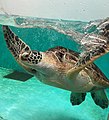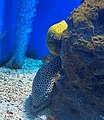|
Sendai Umino-Mori Aquarium
Sendai Umino-Mori Aquarium (仙台うみの杜水族館, Sendai Umino-Mori Suizokukan, lit. 'Sendai Ocean's Forest Aquarium') is a public aquarium located in Sendai, Miyagi Prefecture, Japan.[2] It opened in 2015 as a successor to the Marinepia Matsushima Aquarium, which had been open for 88 years. HistoryMarinepia Matsushima Aquarium Marinepia Matsushima Aquarium (マリンピア松島水族館, Marinpia Matsushima Suizokukan, where Marinepia is a combination of Marine 'Marine' and pia 'pier') was a public aquarium in Matsushima, Miyagi. It opened on April 1, 1927, and closed on May 10, 2015, making it the second longest-running aquarium in Japan, after Uozu Aquarium.[citation needed] Marinepia Matsushima Aquarium was operated by Sendai express which, in 2001, began to consider a renewal of the aquarium due to aging.[3] Following the opening of Oga Aquarium Gao and Aquamarine Fukushima, the number of visitors to the aquarium began to decrease.[citation needed] In 2009, Sendai City announced plans to relocate the aquarium to Takasago Central Park in Sendai Port.[3] However, in February 2010, Sendai express canceled its investment in the relocation due to the lack of prospects for raising funds.[4] Then, in 2013, six companies, including Yokohama Hakkeijima Sea Paradise, established the Sendai Aquarium Development Co., Ltd.[5] The new company built Sendai Umino-Mori Aquarium in the hinterland of Sendai Port, where the Marinepia Matsushima Aquarium was supposed to move. Sendai express did not invest in the new aquarium, but the new aquarium accepted animals from the Marinepia aquarium.[6] Tōhoku earthquake and tsunamiIn 2011, the Tōhoku earthquake and tsunami caused seawater and mud to flood Marinepia Matsushima Aquarium, breaking the circulation pump. This resulted in the loss of about 5% of the aquarium's approximately 4000 animals.[7][8][9] The aquarium received new tropical fish and jellyfish from Kamo Aquarium, Osaka Aquarium, and Kagoshima Aquarium.[10][9] Exhibits Inherited from the Marinepia Matsushima Aquarium are Commerson's dolphins[11] and finless porpoises, along with fish from the Sanriku region. The facility is a two-story building with 100 fish tanks. Inside there is a dolphin and sea lion show pool that can accommodate about 1,000 people.[12] Captive blue sharks The aquarium has a focus on rearing and exhibiting blue sharks as representative fish from Sanriku. Bred in a cylindrical tank separate from the main, large tank, most of the young sharks did not last long initially. In 2016, three blue sharks were captured and brought to the aquarium.[13] In 2017 one of these, a male, broke the previous record of captivity of 244 days. The previous record was set at Tokyo Sea Life Park.[14] A blue shark was later captured in 2018 and survived in captivity for 873 days until it died in December 2020, significantly increasing the record.[15] The shark was captured in Shizugawa Bay on July 27, 2018, and taken to the aquarium. The total length at the time of delivery was 51 cm (1.67 ft), the estimated weight was 345g, and it was estimated to be a year old. The cause of death was attributed to disordered swimming due to dehydration. At the time of death, the total length was 114 cm (3.74 ft) and the weight was 4kg. This growth rate was said to be the same as that of wild blue sharks.[16] FacilitiesFloor (1F)
Floor (2F)
Shops
GallerySee also
References
External links
Wikimedia Commons has media related to Sendai Umino-Mori Aquarium. |
||||||||||||||||||||||||||









